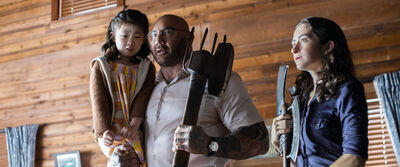
M. Night Shyamalan should probably just stay away from the apocalypse. Who could forget the baffling events of his global warming horror “The Happening,” aptly represented by a scene in which a character just lays down in front of a moving lawn mower? Or what about “After Earth,” which made a box office bomb out of a sci-fi movie starring Will Smith and his son Jaden Smith? There’s something about the end of the world that fascinates Shyamalan—as a sentimental moralist, an overzealous twister, and a button-pusher—there’s also something that always foils him. His latest, “Knock at the Cabin,” uses the question of human behavior during the threat of end times to create a morality study that progressively hollows itself out. It’s another minor work from a director whose films, especially after “After Earth,” have been mostly major.
It’s a shame that the story isn’t so good, because the film has a rich and earthy Kodak-shot presentation from co-cinematographers Jarin Blaschke (“The Lighthouse”) and Lowell A. Meyer (“Thunder Road”), who turn many scenes of characters standing in mostly the same living room into striking studies of pleading faces in close-up. It looks about as realized as a movie like this could be. And the performances have enough uniform intensity, even when the writing is only playing games. It’s a striking ensemble piece by design, and creates some promise early on, but Shyamalan’s larger intent doesn’t give “Knock at the Cabin” nearly enough resonance.
The standout performance comes from Dave Bautista, in his most tatted-up teddy bear mode possible, wearing glasses like he did in “Blade Runner 2049” to suggest the gentle boy inside his grizzly physique. For a movie about how humans choose to interact with one another, his acting is incredibly disarming here and sometimes moving in how he chooses to speak so gently while enacting a plan filled with the unthinkable. His character Leonard is a second-grade teacher from Chicago who has united with three other people (played by Rupert Grint, Abby Quinn, and Nikki Amuka-Bird) who have also had life-changing visions of the apocalypse. They approach a cabin in the woods with sharp weapons in hand, and they do not want to hurt the people inside. But they will enact the violence that they feel they must.
The targeted family is that of young Wen (Kristen Cui) and her two dads, Eric (Jonathan Groff) and Andrew (Ben Aldridge). They do not know why they have been chosen, but it does not matter. Tied up in chairs before their weapon-wielding captors, they must decide to kill one of their family of three to stop an impending apocalypse. They cannot kill themselves, and if they reject their captors’ prospect, something awful will happen in the cabin, and a plague will be unleashed. The first time Eric and Andrew effusively say no, towering tsunamis are conjured, and deadly earthquakes ensue.
Are Leonard and his friends onto something, or is this all a coincidence? Is it manipulation? There may be no force more powerful on this earth than belief. It can be a tool that builds communities or a weapon that destroys lives; a movie like “Knock at the Cabin” needs to wriggle in that magnanimous uncertainty of belief, and instead, it only sits and admires it. It’s like presenting QAnon devotees and people who think the Earth is flat as possibly being right, for the sake of both sides-ism. Shyamalan isn’t nudging about a divided people (like Jordan Peele’s “Us,” which echoes through the woods of this movie), but lazily stirring the fear of conspiracy.
Cut back to us, well aware that our collective brains are broken, waiting for a larger point: we are stuck with a frustrating and self-serious movie that kneels before its zealousness but also continually emphasizes why Leonard and the others would sow skepticism. The script carefully doles out information about everyone to toy with coincidence and happenstance, but it’s more stirring, less building. Shyamalan does not have the nuance to handle this idea, as confirmed when his expected twist comes minutes before the end.
Even with these sharp weapons, bizarre motivations, and that whole apocalypse thing, “Knock at the Cabin” lacks a key squeamish element. Not that the movie needs gore, but the threat of violence in this immediate scenario is specifically numbed by cutaways; for a story pitched in the human capacity to recognize another’s life value, there just isn’t the terror that could create some of its emotional stakes. The lack of it is deeply felt once it becomes apparent what monsters this movie is and isn’t dealing with, while showing how these people are driven by something that forces them to do awful things. Instead, “Knock at the Cabin” creates one anticlimax after another.
The script, co-written by Shyamalan, Steve Desmond, and Michael Sherman (adapting Paul Tremblay’s book The Cabin at the End of the World), does better in making us worry for the targeted family. During this present-day stress, “Knock at the Cabin” cuts back and forth between the love story of Eric and Andrew, and their life with adopted daughter Wen. Groff and Aldridge are heartbreaking as they slowly become opposites: Aldridge embodies one’s tough exterior against a threatening world, while Groff gradually depicts the journey of seeing the light. Together, they show the pain of possibly making The Choice, and how Eric and Andrew don’t want to in part because of their deep love for each other. They also help provide more substance to the film’s representation of a same-sex married couple, which on one hand, more of this please, but on the other hand, still feels like major studio productions have a lot more work to do.
“Knock at the Cabin” has glimmers of interest as a parable about people trying to preserve all of humanity: not just the population, but the concept. The work of Leonard and co. is something like a promotion of empathy, though as is often said about faith: it’s the messengers who need work. By trying to make a grand statement to a post-lockdown theatergoing audience about what they are willing to believe—but also about how far they are willing to go for others—Shyamalan trips over himself and neglects to give them much of a movie.
Now playing in theaters.




